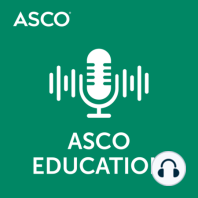6 min listen
Cancer Topics - Adjusting Cancer Care During Covid-19
FromASCO Education
ratings:
Length:
31 minutes
Released:
Apr 8, 2021
Format:
Podcast episode
Description
How has Covid-19 has affected cancer care? Listen to the experts discuss postponing and modifying cancer treatment during a pandemic. Moderated by Dr. Helen Chew, featuring Drs. Mary-Beth Percival, Oliver Eng, and Toni Choueiri. We hope you enjoy this episode of the ASCO eLearning Podcast. Subscribe: Apple Podcasts, Google Podcasts | Additional resources: elearning.asco.org | Contact Us (Airdate: 4/8/2021) TRANSCRIPT [MUSIC PLAYING] SPEAKER 1: The purpose of this podcast is to educate and inform. This is not a substitute for medical care and is not intended for use in the diagnosis or treatment of individual conditions. Guests on this podcast express their own opinions, experience, and conclusions. The mention of any product, service, organization, activity, or therapy should not be construed as an ASCO endorsement. DR. HELEN CHEW: Hello and welcome to ASCO's podcast episode focused on cancer therapy modifications during the COVID-19 pandemic. My name is Dr. Helen Chew, and I'm a medical oncologist and fellowship program director at the UC Davis Comprehensive Cancer Center. I am pleased to introduce our four guest speakers today. Dr. Toni Choueiri is a medical oncologist specializing in genitourinary cancers from Dana-Farber Cancer Institute. Dr. Choueiri is also director of the Lank Center for Genitourinary Oncology and the Kidney Cancer Center and a Professor of Medicine at Harvard Medical School. We are also joined by Dr. Mary Elizabeth Percival from Seattle Cancer Care Alliance. Dr. Percival is a hematologist oncologist specializing in AML and myelodysplastic syndrome. She's also serving as an Assistant Professor of Medicine at the University of Washington and Fred Hutchinson Cancer Research Center. Our next guest speaker today is Dr. Oliver Eng, a surgical oncologist and Assistant Professor of Surgery at the University of Chicago. Dr. Eng focuses on treatment of cancers of the abdomen. And finally, we are also joined by Dr. Jennifer Sheng, a medical oncologist and Assistant Professor of Medicine at Johns Hopkins University. Dr. Sheng primarily treats patients with breast cancer. Many oncologists around the world have been struggling with providing quality care during the pandemic. We are excited to launch a discussion of experiences at different institutions, guidance, and lessons learned that our listeners may apply in their own practice. Starting with you, Dr. Choueiri, can you tell us about the International Survey of Oncologists you and your colleagues conducted in 2020 about the impact of the pandemic on decision making? DR. TONI CHOUEIRI: Oh thank you, Dr. Chew. And I want to really thank ASCO for always being at the forefront here of educating the oncology community about the latest here, and we're all in this pandemic. And I remember where everything started, and we were just getting ready to see what we could do to protect our patient, our health care worker, with this novel coronavirus. So one thing we've done as a group we started an online survey between March and April for a month. And that involved around 340 plus oncologists from 28 countries to understand what is the readiness measure taken by oncologists to protect patient and health care workers here? We really had no idea. We found first that the pandemic, really every country had an outbreak over 99%. PPEs were over 90% provided, and the telemedicine started early on. Around 80% of folks did telemedicine. We also saw that we did not have any routine testing for oncology patients. Only 3% performed systematic testing in all patients. Then when we asked the oncologists, knowing we had no data, what do they think about systemic therapy? The vast majority thought that systemic therapy here you have to consider comorbidities and age. They also felt that hormonal treatment and tyrosine kinase inhibitors were relatively safe. On the other hand, cytotoxic chemotherapy and immune therapies potentially are not safe. Now we know for the future, w
Released:
Apr 8, 2021
Format:
Podcast episode
Titles in the series (100)
Self-Evaluation: NSCLC Treatment Metastatic: Self-Evaluation: NSCLC Treatment Metastatic by ASCO Education
